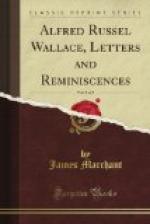To his mind there was no difficulty in believing in the existence of consciousness apart from material organism; though he could not readily conceive of pure mind, or pure spirit, apart from some kind of substantial envelope or substratum. Many of the views suggested in “Man’s Place in the Universe” as to man’s spiritual progress hereafter, the reason or ultimate purpose for which he was brought into existence, were enlarged upon, later, in “The World of Life.” As early, however, as 1903, Wallace did not hesitate to express his own firm conviction that Science and Spiritualism were in many ways closely akin.
He believed that the near future would show the strong tendency of scientists to become more religious or spiritual. The process, he thought, would be slow, as the general attitude has never been more materialistic than now. A few have been bold enough to assert their belief in some outside power, but the leading scientific men are, as a rule, dead against them. “They seem,” he once remarked, “to think, and to like to think, that the whole phenomena of life will one day be reduced to terms of matter and motion, and that every vegetable, animal, and human product will be explained, and may some day be artificially produced, by chemical action. But even if this were so, behind it all there would still remain an unexplained mystery.”
Closely associated with “Man’s Place in the Universe” is a small volume, “Is Mars Habitable?” This was first commenced as a review of Professor Percival Lowell’s book, “Mars and its Canals,” with the object of showing that the large amount of new and interesting facts contained in this work did not invalidate the conclusion that he (Wallace) had reached in 1903—that Mars is not habitable. The conclusions to which his argument led him were these:
(1) All physicists are agreed that ... Mars would have a mean temperature of about 35 deg. F. owing to its distance from the sun.
(2) But the very low temperatures on the earth under the equator at a height where the barometer stands at about three times as high as on Mars, proves that from scantiness of atmosphere alone Mars cannot possibly have a temperature as high as the freezing-point of water. The combination of these two results must bring down the temperature of Mars to a degree wholly incompatible with the existence of animal life.
(3) The quite independent proof that water-vapour cannot exist on Mars, and that, therefore, the first essential of organic life—water—is non-existent.
The conclusion from these three independent proofs ... is therefore irresistible—that animal life, especially in its highest forms, cannot exist. Mars, therefore, is not only uninhabited by intelligent beings ... but is absolutely uninhabitable.
* * * * *
In contrast to his purely scientific interest in astronomy, Wallace was moved by the romance of the “stars,” akin to his enthusiastic love of beautiful butterflies. Had it not been for this touch of romance and idealism in his writings on astronomy, they would have lost much of their charm for the general reader. His breadth of vision transforms him from a mere student of astronomy into a seer who became ever more deeply conscious of the mystery both “before and behind.”




